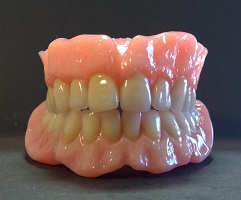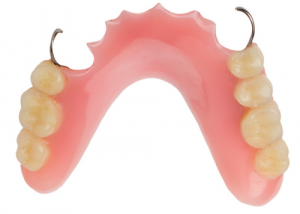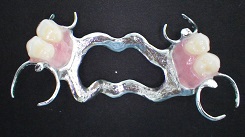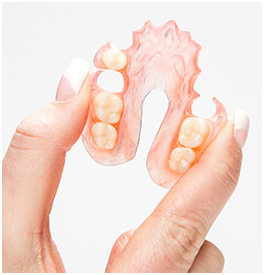Dentures
Dentures are a very effective way to replace missing teeth. They are removable plastic or metal frameworks that carry single or multiple false teeth. If you choose to replace missing teeth with dentures, they will be custom made to fit the size and shape of your mouth, making them feel and look as natural as possible.
What is the difference between full and partial dentures?
Depending on how many teeth you have missing, you may have a full or partial denture.
A full denture is a removable acrylic base, or plate, which sits over the gums. On top of this sits a set of crafted acrylic teeth, which will be made to look as natural as possible. This replaces your original teeth.
A partial denture is is specially made to fit in any gaps you may have the teeth are carefully chosen to blend with your own natural teeth. Partial dentures may have a base plate made of plastic or metal. Those made with metal are stronger and lighter,
Your dentist will work with you to provide colour and appearance that is best for you. Your denture will be designed and made just for you.
Valplast Flexible Partial Dentures
The Valplast Flexible Partial is an unbreakable, removable partial that many people find very comfortable. These lightweight partials are practically invisible, and completely eliminate the unsightly metal clasps. Most Valplast Flexible Partials are fabricated without the use of a metal frame – made instead from a strong, durable plastic that snaps securely and comfortably into place around existing natural teeth and gums.
The plastic used is so strong that the partial made from it can be very thin, eliminating that heavy, bulky feeling that make wearing partials so unpleasant. Plus, the colour, shape and design of Valplast Flexible Partials blends in well with the natural appearance of the gums, making the partial virtually invisible.
Looking after your dentures and mouth
Your dentures should last several years if you look after them. Follow these tips to keep your dentures and your mouth fresh and healthy.
Caring for dentures
- Brush, soak, then brush again.Clean your dentures after every meal using a soft toothbrush and soap or toothpaste. Make sure you clean all the surfaces of your dentures, including the areas that sit against your gums and the roof of your mouth. You can soak them in a denture cleaning solution if you wish, as this may help to remove stains. Then brush your dentures again.
- Clean over a soft surface. Dentures might break if you drop them. It’s a good idea to clean your dentures over a soft surface or a bowl of water to ensure they don’t get broken.
- Use the correct products. Some dentures have a soft lining. Ask your dentist for advice before you use a denture cleaning solution on this type of denture. The linings are delicate and can be damaged by cleaning solutions.
- Don’t let them dry out. Leave dentures in a plastic box or glass of cold water overnight so they don’t dry out.
Caring for your mouth
- Brush your teeth and gums.Brush your remaining natural teeth twice a day with fluoride toothpaste and use dental floss or tape to clean between them. If you have dentures, it’s important to clean your gums, tongue and the roof of your mouth with a soft brush.
- Take dentures out at night. . It’s important to take your dentures out at night to allow your mouth to rest. Doing this can also help to prevent infections.
- Have regular check-ups. Even if you have no natural teeth left, it’s still important to have regular check-ups with your dentist. Your dentist will check the fit of your dentures, and look for any problem areas on your gums and soft tissue.
Dentures should last a long time if you look after them properly. But if they become worn or don’t fit properly, they can be irritating and uncomfortable. Ideally, you should have your dentures re-made before these problems arise.
Visit your dentist regularly so they can advise you when it’s time to have new dentures fitted.



